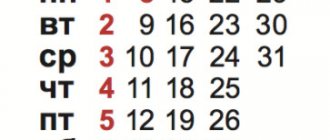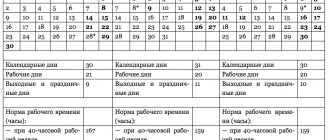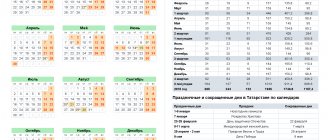When working on holidays, monetary compensation is provided, and a subordinate can also choose double pay for work on a day off. It is more profitable for the company to give an additional day off, but the subordinate has the right to choose on his own.
According to Art. 113 of the Labor Code of the Russian Federation, work is prohibited on holidays and weekends (in particular, on the May holidays of 2018). Employment is possible for: performing urgent work, the transfer of which would endanger the life or health of others; eliminating the consequences of emergency incidents; performing work imposed by martial law.
January holidays
January 2021 is a long-awaited time for Russians. This month, the Russian Federation celebrates not only the state holidays New Year, but also church holidays - the Nativity of Christ. Therefore, in January there are quite long non-working days off. There are a total of 31 calendar days in January. The holiday calendar for January 2021 looks like this:
- January 1, 2, 3, 4, 5, 6 and 8 – New Year holidays;
- January 7 – Christmas.
As a result, January 2021 has only 14 holidays and weekends:
Let's decipher each day of non-working holidays in January 2018 (from December 30 to January 8):
Holidays in November 2021 in Russia
There are also unofficial holidays in Russia, which the production calendar does not consider as days off, but, nevertheless, people celebrate them with pleasure. Orthodox Christians have not forgotten the decree of Tsar Alexei Mikhailovich and November 4 is revered as the feast of the Kazan Icon of the Mother of God.
It was with her that in the distant 17th century the people’s militia approached the walls of Kitay-Gorod. On the first Saturday of November, the country also celebrates World Men's Day, approved by the last president of the USSR, Mikhail Gorbachev.
Interesting!
Few people know that November 19 is International Men's Day. This date was intended to draw attention to the injustice faced by the entire male sex, maintaining their health and the importance of their role in raising children.
In addition to public holidays, many citizens also celebrate professional dates. There are a huge number of holidays in November, such as the Day of the Bailiff of the Russian Federation, or the Day of the Military Intelligence Officer. There are also dates in this list dedicated to medical workers - ophthalmologist, speech therapist, psychologist. A complete list of professional holidays can always be found in the public domain.
These are the kind of weekends and holidays in November 2021 in Russia that the calendar promises us. There is very little time left to make your plans for the coming days.
How the weekend was postponed in 2018
Article 112 of the Labor Code of the Russian Federation provides that the transfer of days off is carried out for the purpose of rational planning of working time in organizations and taking into account the interests of various categories of citizens of the Russian Federation in creating conditions for proper rest. For these purposes, Decree of the Government of the Russian Federation of October 14, 2021 No. 1250 “On the transfer of weekends in 2021” provides for the following shift of weekends:
As a result, in January 2021 the following transfers of weekend days are provided:
- from Saturday 6 January to Friday 9 March
- from Sunday 7 January to Wednesday 2 May.
Production calendar for November 2018 with a five-day work week
Most Russians work a five-day work week. For them, in November 2021, the grid of the production calendar, taking into account the holiday, is quite simple.
On Monday, November 5, an additional day off appears; all Saturdays and Sundays of this month remain closed.
The first full working week of November will therefore last four days. Of the 30 days of the month, 21 days will be working days, 9 days will be weekends. With a 40-hour work week in November, they will work 168 hours.
Work on weekends and non-working holidays in January
According to the law, work on weekends and non-working holidays is prohibited (Article 113 of the Labor Code of the Russian Federation). However, there are exceptions to this rule.
For example, it is allowed to involve an employee in work on a weekend/non-working holiday if there is a need to perform unforeseen work, on the urgent completion of which the further normal functioning of the organization depends. In this case, the employee can be involved only with his written consent.
Please note that sometimes hiring an employee on weekends/non-working holidays (including in January 2021) is possible without obtaining consent from him. For example, such situations include the involvement of an employee to prevent a catastrophe/industrial accident or eliminate the consequences of a catastrophe/industrial accident/natural disaster (Article 113 of the Labor Code of the Russian Federation).
Payment for working days according to the usual schedule
In January, with a five-day workday, Russians will have to work only 15 days. Therefore, the question often arises of how New Year holidays are paid with a salary, given that the number of working days has been reduced. Despite the fact that most work less, wages are paid in full. If a salaried employee has worked all the required days, then payment is made in full. This follows from the same article 112 of the Labor Code of the Russian Federation. It makes no sense to separately consider the question of whether New Year's holidays are paid in government agencies or municipal structures, since the law states: the presence of non-working holidays in a calendar month is not grounds for reducing wages for salaried employees.
As for the remaining employees (piece workers, hourly workers, etc.) who were not involved in work during the New Year holidays, for non-working holidays they are paid additional remuneration, the amount of which is determined by the internal LNA.
Read more: How to calculate salary based on salary
IMPORTANT!
If an employee is on sick leave, he will be paid benefits after the certificate of incapacity for work is closed. If an employee is on vacation, he already receives money for the New Year holidays 3 days before it starts, plus the vacation is extended due to official holidays. But there are situations when they won’t pay anything. The first is that the employment contract is valid, but the employee took unpaid leave at his own expense. The second is that the person is registered in the organization, but is not currently fulfilling his duties (applies to women on maternity leave, employees caring for a newborn).
How is work paid on January holidays?
Work on weekends, as well as non-working holidays, is subject to payment at least double (Article 153 of the Labor Code of the Russian Federation). The exact amounts of remuneration for work on weekends/non-working holidays (including January 2021) can be specified in a collective agreement, local regulation or employment contract.
An employee who worked on a day off/non-working holiday may be given another day of rest. In this case, work on a weekend/non-working holiday is paid at a single rate, and the day of rest chosen by the employee is not paid (Article 153 of the Labor Code of the Russian Federation). However, the initiative to replace double pay with another day of rest should come from the employee, and not from the employer.
Production calendar grid for November 2018 with a six-day work week
The calendar of working days and weekends for November will be a little more complicated for those who work six days a week.
In this case, Monday, the 5th, also becomes an additional day off. All Sundays of the month remain closed.
The only difference from the five-day version of the calendar is that a pre-holiday short working day appears. It becomes Saturday, November 3rd. On this day, the work shift will be one hour shorter than the usual routine (no more than five hours according to existing standards).
Of the 30 days in November, 25 days will be working days and 5 days will be weekends.
Weekend replacement
By agreement with the employer, the employee may receive another day off instead of additional pay for working on a holiday. To do this, the employee needs to write a statement indicating the specific date of the planned day off. In this case, the payment for the holiday will be single, and the day off will not be paid. In this case, the employer, based on the application, issues an order to grant the employee a day off. Moreover, even if on a holiday the employee worked part-time, but only for a few hours, the day off is granted in full (
Salary calculation on holidays with salary
To determine the amount of payment for going to work on a holiday based on salary, it is necessary to determine the average monthly number of working hours according to the employee’s work schedule. You can calculate it like this:
Further calculation depends on whether the working time on holidays exceeded the monthly working hours or not. If it does not exceed, then calculate the payment in a single amount using the formula:
Use a similar calculation if the employee wanted to take an additional day off.
If the work time on a non-working day exceeded the monthly working time standard, then compensation must be paid in double amount. Calculate it like this:
Amendments to regulatory documents
How the organization pays for work on a holiday is established in the labor or collective agreement, or in the regulations on remuneration. If it is necessary to make changes to regulatory documents, companies proceed as follows: after negotiations with employee representatives, an additional agreement to the collective agreement is drawn up, after which the additional agreement is sent to the labor inspectorate for registration, and then the additional agreement is presented to the organization’s employees under the signature.
If payment for work on a holiday is established in the wage regulations, then an order is issued to change it. There is no special form for such an order; the main thing is that an acquaintance sheet is attached to it, on which all employees put their signature confirming familiarization.
If the conditions for payment for a working holiday are provided for in the employment contract, then when changes are made, an additional agreement to it is drawn up.
Wording on remuneration on a holiday or day off in regulatory documents.
Restrictions for certain categories
It is prohibited to involve minors (Article 268 of the Labor Code of the Russian Federation) and pregnant women (Article 259 of the Labor Code of the Russian Federation) in performing labor duties on holidays.
For some categories of employees, it is possible to perform work duties on holidays only if there is no prohibition for health reasons. At the same time, it is necessary to obtain consent from them, even if the exit is due to an emergency situation. These employees include:
- disabled people;
- women with children under three years of age;
- parents raising a child without a spouse, guardians of children under the age of five;
- parents, guardians of disabled children;
- employees who care for a family member based on a medical certificate.
Taking into account all allowances
The Constitutional Court obliged employers to pay employees on weekends and holidays not only at increased rates, but also with the preservation of all incentives and compensation payments. The case was considered using the example of civilian personnel of the Russian Ministry of Defense.
The uncertainty of the provisions of Article 153 of the Labor Code of the Russian Federation immediately affected 13 employees of the rescue tugs “Fotiy Krylov” and “SB-522”. As part of a battle group, these ships carried out assigned tasks in the Primorsky Territory. The crews were at sea, regardless of the calendar. However, when the employees received their salaries, it turned out that they were paid less for the weekend than for a regular working day. For example, as follows from the barmaid’s statement, her payment for one hour of work on a weekday was 162 rubles 66 kopecks, and on a weekend - less than 145 rubles. The captain and chief mate of the tugboats, sailors, electricians, and radio operators found themselves in the same situation.
13 tugboat employees suffered from the uncertainty of the provisions of Article 153 of the Labor Code of the Russian Federation
However, the courts of general jurisdiction did not meet the applicants halfway: Article 153 of the Labor Code of the Russian Federation does not indicate the need to take into account incentives and compensation payments. “Work on a weekend or a non-working holiday is paid at least double the amount” - and the employer calculated it based on the salary.
According to the applicants, this approach is discriminatory, because people who worked on a weekend or holiday find themselves in a worse position than employees whose working day, relatively speaking, is five days a week from nine to six. In addition, Article 37 of the Constitution of the Russian Federation states that “a worker under an employment contract is guaranteed the length of working hours, weekends and holidays, and paid annual leave established by federal law.”
It should be noted that the Constitutional Court has already considered disputes regarding the payment of wages to civilian personnel of military units and organizations of the Armed Forces of the Russian Federation for work on weekends and non-working holidays and has repeatedly confirmed that the absence in Article 153 of the Labor Code of the Russian Federation of a direct indication of the application when paying for work on a weekend or holiday compensation and incentive payments “does not mean that such payments are not subject to accrual.” However, in September 2021, the Minister of Defense issued an order, which specified that Ministry of Defense employees should be paid for work on such days based solely on the tariff rate or salary. After that, law enforcement practice also changed, including in the Supreme Court of the Russian Federation.
Meanwhile, the Constitutional Court pointed out, the very understanding of Article 153 indicates that payment for work outside working hours should exceed “usual”.
“The compensation and incentive payments provided for within a specific wage system are an integral part of wages, and therefore must be taken into account by the employer when determining wages and accrued for all periods of work, including weekends and non-working holidays,” the Constitutional Court of the Russian Federation indicated. — Otherwise, it would mean arbitrary application of the remuneration system in force in the relevant organization, and the goal of establishing compensation and incentive payments would not be achieved.
Thus, Article 153 of the Labor Code of the Russian Federation in itself does not contradict the Constitution of the Russian Federation, the Constitutional Court of the Russian Federation recognized. However, the employer is obliged to calculate payment for work on a weekend or holiday based on the tariff part of the salary, calculated at an amount of at least double the daily or hourly rate, including all provided compensation and incentive payments. The applicants' cases are subject to review.
Vacation falls on holidays
Employees often take vacations to maximize their vacation time, including non-working holidays. Therefore, in practice, cases often arise when holidays occur during the period of an employee’s next paid leave.
According to the Labor Code, such days do not need to be included in the number of vacation days (Article 120 of the Labor Code of the Russian Federation). That is, holidays that fall on vacation increase the vacation time. For example, an employee is going on vacation from June 5 to June 18, 2021. During the holiday period there is a holiday - June 12th.
This means that the vacation should be extended by one day. The employee will return to work on June 20 (for more information, see “Transferring vacation days due to holidays”).










